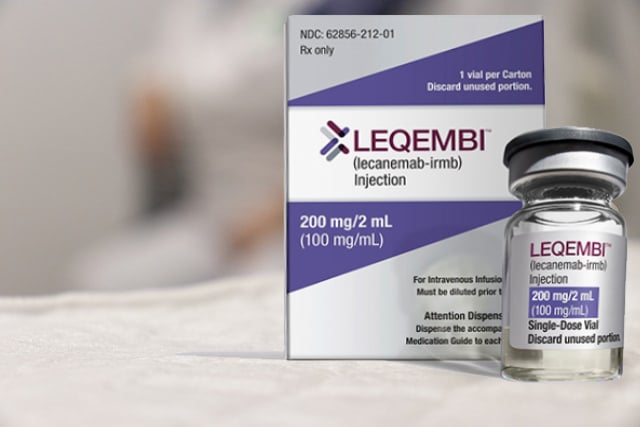Leqembi clinical trials are still ongoing, and participants have a 50/50 chance of receiving the $26,500-per-year drug for free. The other half will receive a placebo.
Eisai and Biogen’s new anti-amyloid drug Leqembi was recently approved through the FDA’s accelerated pathway. Now, it’s on the market with a price tag of approximately $26,500 per person per year. But the ship hasn’t sailed on participating in Leqembi’s clinical trials just yet.
Through these trials, eligible participants have the chance to receive the drug — designed to slow or stop Alzheimer’s progression in people in early stages of the disease — for free, while contributing to important research.
How much does Leqembi cost?
The out-of-pocket price of the Alzheimer’s drug Leqembi is based on quantity administered, which is determined by weight. The aforementioned $26,500 is the cost of a year’s worth of Leqembi for a person weighing the approximate average adult human weight of 165 pounds.
The cost to patients is also dependent on insurance coverage. The government agency that oversees Medicare and Medicaid will decide later this year whether to provide federal coverage for the drug. Coverage by private insurers may differ based on insurer and individual case.
Leqembi trial AHEAD 3-45
One of two drug trials currently testing Alzheimer’s drug Leqemi is AHEAD 3-45. This study is endeavoring to confirm whether Leqembi can delay or prevent Alzheimer’s in asymptomatic people at risk of developing Alzheimer’s.
As of this writing, the AHEAD 3-45 trial is recruiting 1,165 people aged 55 to 80 with high levels of Alzheimer’s blood biomarkers. In order for candidates aged 55 to 64 to be eligible, they must have at least one of a few additional risk factors: a first-degree relative diagnosed with dementia before age 75; at least one copy of the ApoE4 gene; or a positive amyloid result on a PET scan or lumbar puncture.
Trial details: The study will last a total of four years. There are trial centers available in more than 65 U.S. locations. You must also have one study partner who will transport you to the clinic and answer questions from researchers once per year. Patients will receive $50 for each required study visit that they attend.
Do participants of the AHEAD 3-45 get Leqembi for free?
Since the trial is blinded and placebo-controlled, there is a 50-50 chance participants will receive the drug. They will only know whether they received the drug or placebo at the end of the study.
If the drug meets its benchmarks in its continued trial and Leqembi receives full FDA approval, everyone in the study will be given the option to continue to receive the drug for free. Whether that will certainly be the case is not yet known.
DIAN-TU trial for lecanemab and tau-targeting drug E2814
The other drug trial now underway involving Leqembi is called the Dominantly Inherited Alzheimer Network Trials Unit (DIAN-TU). DIAN-TU has a more specific question it seeks to answer: Does administering an anti-tau antibody also by drugmaker Eisai, currently known as E2814, in addition to Leqembi modify the course of Alzheimer’s disease for people who will likely develop or are already living with inherited forms of early-onset Alzheimer’s?
The DIAN-TU study is recruiting 168 people with these genetic biomarkers that mean they’ll eventually develop the disease. Patients are eligible up to 10 years before they are predicted, based on their genetic predisposition to the disease, to first experience symptoms, or alternatively within 10 years following their diagnosis.
Do participants of the DIAN-TU trial get Leqembi for free?
Everyone in the DIAN-TU trial will receive lecanemab, the generic drug name for Leqembi. In addition they have a 50-50 chance of receiving the experimental anti-Tau antibody, E2814. The other half of participants receive a lecanemab plus a placebo. After the study, participants will find out if they received E2814 or the placebo.
An offer to continue receiving Leqembi for free after the four-year trial depends on whether Leqembi receives full approval after the conclusion of its ongoing trials in 2027. Depending on the results of the study, they may be allowed to continue E2814.
Trial details: The study will last four years with the potential of being extended if the tau drug is shown to be effective.There are 12 clinical trial centers in the U.S. that are involved in running the trial.
Is Leqembi safe?
All drugs carry risks. Drugs in clinical trials are new and scientists are still gathering data on their effects and efficacy in different populations. There are additional risks of mild or possibly severe side effects, or even fatality, for people with certain risk factors or those on certain medications:
- People with an APOE4 genotype did not show cognitive benefits in the Phase 3 trial and are more likely to experience brain bleeds
- Anticoagulant or clot-busting drugs
- A history including four or more previous small brain bleeds or one large brain bleed
- Previous history of stroke
Again, drugs carry risks. These risks can be serious. Some people with these existing factors died during earlier phases of the Leqembi clinical trials.
Here’s how to see if you’re eligible to enroll in Leqembi’s clinical trials
People interested in participating in the AHEAD 3-45 trial should contact the trial’s recruiters at ahead-participate@usc.edu. Those interested in participating in DIAN-TU can reach out to the trial’s Senior Clinical Research Coordinator Ellen Ziegemeier and Clinical Research Coordinator Jennifer Petranek at or dianexr@wustl.edu.
UPDATE: 6 February, 10:39 A.M. ET – The title was updated for clarity.


I lost my mother to Alzheimer’s. I don’t want to lose myself to the same disease. Thank you for considering me.
I am sending this for my wife of 55 years, I find it difficult and now that I am retired would love to spend more quality time with her, thank you